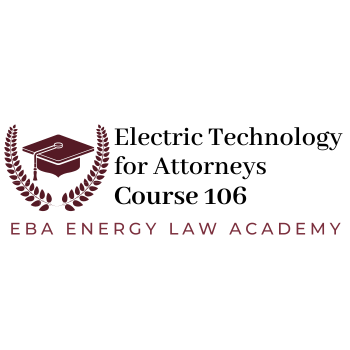
- This event has passed.
Energy Law Academy Course 106: Electric Industry Technology for Lawyers
June 22, 2023 @ 12:00 pm – June 23, 2023 @ 12:00 pm Mountain Time
The purpose of this EBA Energy Law Academy course is to provide attorneys who are new to the practice of energy law in the electric industry a foundational understanding of the basic technology in the industry. Our faculty will cover basic technology fundamentals and core concepts. The course also provides an overview of key legal and policy issues affecting the electric industry today.
Day 1:
1:10 – 2:15 PM: Introductory Concepts
In this segment of the course, participants will learn the basic terminology and concepts for understanding the technology behind the electric grid, such as the basic tools for measuring electricity, the difference between capacity and energy, the difference between real and reactive power, and the difference between direct and alternating current. Students will gain an understanding of how today’s electrical grid is configured – and why.
James Cho
Grid Operations Performance Oprimization Analyst
Tri-State Generation
2:30 – 3:45 PM: Generation
This segment of the course will address the basic technological concepts underlying electric generation, followed by an in-depth review of the various types of generating technologies. Students will gain an understanding the basics of generation, including the difference between baseload, intermediate, peak and intermittent generation; heat rate; blackstart generators; and station power. Our instructors will then discuss different types of generation – coal, natural gas, and nuclear – and the environmental controls that are used in power plants using those fuels. The session will wrap up with a discussion of renewable generation (hydropower, wind, solar, and biomass).
Matthew Adeleke
Office of Electric Reliability
Federal Energy Regulatory Commission
Deepak Ramlatchan
Director, Division of Engineering and Logistics
Federal Energy Regulatory Commission
4:00 – 5:30 PM: Distributed Energy Resources (DER)
This segment of the seminar will address new technologies that perform a power supply function. The session will cover the basics of distributed generation (DG) technologies, including combined heat and power and small renewable generators and how they are integrated with the electric grid. The session will also address energy storage, energy efficiency, and demand response, including how they are dispatched by grid operators. Our instructors also will cover emerging issues such as the impact of the Internet of Things and electric vehicles.
Deepak Ramlatchan
Director, Division of Engineering and Logistics
Federal Energy Regulatory Commission
Matthew Adeleke
Office of Electric Reliability
Federal Energy Regulatory Commission
Day 2:
8:15 – 9:45 AM: Distribution
This segment of the program will focus on the equipment that is used in the delivery of electricity to retail consumers. Students will gain an understanding of the difference between network and radial systems, where and why electric meters are located, operational issues faced by utility operators, how key distribution equipment such as protection systems and transformers work, and what happens in a control room – the place where operation of the electric grid all comes together.
James Cho
Grid Operations Performance Oprimization Analyst
Tri-State Generation
10:00 – 11:30 AM: Transmission
This part of the program will focus on the equipment that is used to deliver electricity from generators to distribution systems and between distribution systems. Students will gain an understanding of the key components of the transmission system such as towers, insulators and conductors, how transmission systems are designed (including concepts such as stability and thermal limits), and operational issues confronted by transmission operators (including loop flows and vegetation management).
James Cho
Grid Operations Performance Oprimization Analyst
Tri-State Generation
11:30 – 12:30: Operations Center Tour
| Type | Member Rate | Non-Member Rate |
| Virtual Participation | $290 | $315 |
| Attorney/Energy Professional | $390 | $415 |
| Young Lawyer | $315 | $415 |
| Government Attorney/EP/Academic | $365 | $415 |
| Solo Attorney/Small Firm | $390 | $415 |
| Student | $140 | $415 |
EBA does not have a hotel block for this event. Please see nearby hotels listed below.
Fairfield Inn & Suites Denver North/Westminster
12080 Melody Drive, Westminster, Colorado, USA, 80234
DoubleTree by Hilton Hotel Denver – Thornton
83 East 120th Avenue
Thornton, Colorado, 80233
Holiday Inn Express & Suites Denver North – Thornton
12030 Grant Street
Thornton, CO 80241
CLE Statement:
This program is eligible for 6.83 hours of CLE credit in 60-minute states and 8.2 hours of CLE credit in 50-minute states. Credit hours are estimated and are subject to each state’s approval and credit rounding rules.

